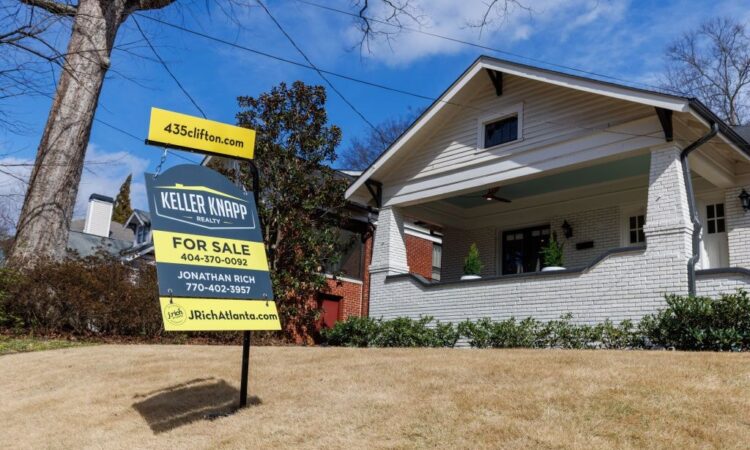
But in the US, prices have barely budged. The explanation is straightforward if not exactly simple: the 30-year mortgage. It is a financial product that should not exist — and it may well be the only thing keeping the US housing market from collapse right now. (1)
The risk of a housing crash is not only that people could lose their homes and much of their wealth, as they did in 2008. It’s that it could cause a deep recession. As the Great Recession showed, a recession brought on by a fall in house prices can be especially severe, since housing tends to be the largest component of household wealth. New Zealand is already in a recession , and there are concerns that the housing market will cause more economic turmoil in the UK .
Even as prices for other things are going up, house prices aren’t, at least in developed countries. This is because house prices are more sensitive to interest rates. A decade of low rates — spurred by the US Federal Reserve’s policy of quantitative easing, in which the Fed bought up lots of mortgage-backed securities, and then accelerated by the pandemic — brought mortgage rates to historic lows in 2020 and 2021. Many Americans bought new homes or refinanced in the last several years. Finally, there are housing shortages in desirable areas, and more foreign and investment buyers, all of which have driven up prices in the US since the last housing bust.
Nowhere in the world is the 30-year fixed-rate mortgage as popular as it is in the US — and for good reason. Fannie Mae (created in 1938) and Freddie Mac (1970) made the 30-year fixed-rate mortgage popular in the US, because they would buy mortgages from banks, offloading both their rate and default risk. In absence of government intervention, no sane banker would lend a single household so much money for 30 years at a fixed rate.
Variable mortgages rates still exist in the US, offering lower rates, and before 2008 they made up about 30% of the US mortgage market. But between falling rates and the scars of the 2008 housing crisis, they have become less common. By 2021, only 2.2% of mortgage applications were for adjustable-rate mortgages, while in 2022 85% of mortgages were fixed 30-year.
So it is no surprise that, according to Redfin , 90% of households are paying less than current rates on their mortgage. Some 62% of homeowners have a mortgage rate that’s less than 4%, and 23.5% pay less than 3% . Now rates are more than double that, raising the question: Who can afford to move? That constrains supply and keeps prices from falling very much.
Homeowners aren’t so lucky in other countries, where long-term fixed-rate mortgages are far less common. Even fixed rates reset after several years, and that is already happening for some borrowers in Europe, the UK and New Zealand. About 800,000 British homeowners’ mortgages will come off their fixed rates later this year, and another 1.6 million in 2024. Mortgage-rate increases are also looming over the Canadian economy. If the labor market weakens, the results could be catastrophic. People could be forced to sell their homes, putting more downward pressure on prices, as happened in the US during the housing crisis.
All of which raises another question: If the 30-year fixed rate mortgage can save US economy from a housing crash, and allow more homeowners to stay in their homes, aren’t all Americans better off?
In the short term, the answer may be yes. But in the long term, the US housing market will be much less fluid because people are tied to their mortgages. It will be harder for people to move, for a better job or to be closer to their families, and there will be less inventory and higher prices for aspiring buyers.
Higher interest rates will hurt homeowners and buyers in other developed markets. The 30-year fixed-rate mortgage will protect a lot of Americans from that pain. But it could also mean a less dynamic US economy for years to come.
Elsewhere in Bloomberg Opinion:
• The Bank of England Owes Mortgage Payers an Apology: Merryn Somerset Webb
• Lower Mortgage Rates Won’t Make Homes More Affordable: Conor Sen
• Mortgage Lenders Are Selling Homebuyers a Lie: Alexis Leondis
For more Bloomberg Opinion, subscribe to our newsletter.
(1) The other anomalous market, Spain, is doing well in part because it has relatively more variable-rate mortgages than most European countries and people are eager to buy before rates go up. Go figure.
This column does not necessarily reflect the opinion of the editorial board or Bloomberg LP and its owners.
Allison Schrager is a Bloomberg Opinion columnist covering economics. A senior fellow at the Manhattan Institute, she is author of “An Economist Walks Into a Brothel: And Other Unexpected Places to Understand Risk.”
More stories like this are available on bloomberg.com/opinion






